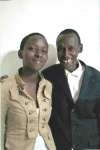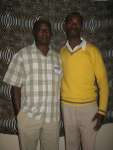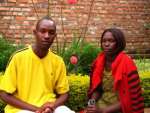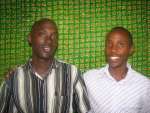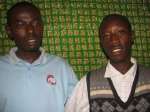Uwamwezi Philomene & Dusabe Nicole
Uwamwezi Philomene talks to Nicole about the difficulties parents face when talking to their children, and how people today can manage busy schedules to remember the past. Dusabe Nicole also wonders about how they can regain trust and love in society when certain people are known to have been murderers, and Uwamwezi Philomene counsels her in love.
Kwizera Samuel & Igihozo Cindy Providence
Kwizera Samuel shares with his niece, Igihozo Cindy Providence, how people lived together in harmony regardless of ethnicity. All people in Rwanda had love for one another before the tragedy of the genocide. Emergency vehicles would not stop to check the ethnicity of a patient before taking them to the hospital. In fact, those riding the emergency vehicles would all be of different ethnicities in the first place. In those days, people helped one another.
Uwamariya Victoire & Kabuto Noah
Kabuto Noah is curious about the trauma he witnesses in children who are not old enough to remember or have experienced the genocide, but have been affected by it nonetheless. Uwamariya Victoire tells him about the ways the genocide changed how lives are experienced, complicating everything from family structure to education. Most importantly, Kabuto Noah and Uwamariya Victoire discuss the ways that fear, anger, and sadness are best handled.
Habumukiza Bernard & Mujyanama Eric
Habumukiza Bernard talks to his student, Mujyanama Eric, about the importance of education and his decision to become a teacher, reminding him that the most important aspect of employment isn't always how much money you make.
"When you are at school you have to be united, to know that you are all students from the same
school, you are all Rwandans; you are all young and consider yourself as twins who have the
same mother." Habumukiza Bernard
"What is the secret of doing the same job for a long time?" Mujyanama Eric
Umazikungu Beatrice & Gashumba Yves Fabrice
Although Gashumba Yves Fabrice and longs for a peaceful future, he still has a hard time forgiving those involved in the genocide and fears the resurgence of conflict. His friend Umazikungu Beatrice reminds him that kindness toward everyone is the best way to prove that Rwanda can move forward, and it is better to be remembered for acts of kindness rather than the brief satisfaction of taking revenge and being remembered for evil.
Mukakayange Veronique & Muyisenge Onaan
Muyisenge Onaan wants to learn about his family history and the stories his parents passed down to his older sister, Mukakayange Veronique. Mukakayange Veronique recalls the loss of their mother in a violent bombing, finding a way to build a relationship through song, and forgiveness. By discussing the manner in which they personally survived hardship, Muyisenge Onaan and Mukakayange Veronique imagine solutions for a peaceful future for Rwanda.
"There is a proverb in Kinyarwanda which says 'A good neighbor is better than a distant relative'." Mukakayange Veronique
Gahizi Valgas & Nyinawintore Marlaine
Gahizi Valgas begins his story by telling his niece, Nyinawintore Marlaine, about the first time that he realized that he was a refugee. He describes the hardships that he and his family went through because they were not welcomed. He encourages his niece to continue her schooling, because in the past not everyone was given the right to education. He hopes that Nyinawintore Marlaine will fight against anything that could cause another genocide, because he does not want Rwandese to be forced to live as refugees again.
Mukansanze Imfura Chantal & Turatsinze Jimmy
Mukansanze Imfura Chantal explains to Turatsinze Jimmy how he became an orphan and how he got to where he is today. She urges him to continue his education and, equally importantly, to treat everyone as equals, regardless of ethnicity, wealth, or status, not only for himself, but for the future of the country. Turatsinze Jimmy describes his hazy memories as a young boy about the origins of genocide—why did a plane crash start a war? Was there already a plan in place to start the killing? Has there always been a rift between ethnicities?
Mwumvaneza Vincent & Tambo Nelson
Tambo Nelson and his older brother Mwumvaneza Vincent discuss the colonial origins of the ethnic divide between Hutu and Tutsi. Mwumvaneza Vincent explains how, prior to colonialism, Rwanda was divided by wealth and status, not ethnicity, but the presence of colonial settlers and their institutions codified these differences and lead to ethnically divided political parties. Mwumvaneza Vincent wants Tambo Nelson to understand how violence and "genocide ideology" became present in Rwanda as a result of ethnic discrimination in education, work opportunities, and political rights.
Muhizi Jean Claude & Masengesho Jean de Dieu
Muhizi Jean Claude wants to inspire his friend Masengesho Jean de Dieu to be hopeful about the future by reflecting on how much has changed since his youth. Muhizi Jean Claude talks about how the segregation that existed in schools and how political instability contributed to the genocide. In answer to Masengesho Jean de Dieu’s question about ways for people to heal their emotional pain, Muhizi Jean Claude emphasizes youth breaking the cycle of ethnic discrimination.



